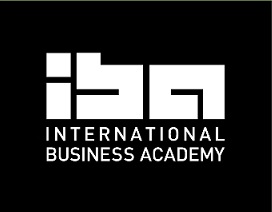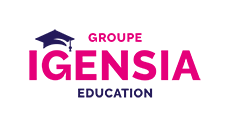International Business Academy


Strengths
Students at the IBA are both Danish and international, as we believe this helps to create an exciting, attractive and international study environment.
Major, Academics
You can choose courses from the following programmes:
• AP Degree in Marketing Management
• Top-up BA in International Sales and Marketing Management
Campus
The new building, located in Havneparken in the centre of Kolding, was brought into service in summer 2019.
The very modern building extends right down to the stream and has a wide band of staggered glass around the outside, so that students and all the other members of the IBA can look out and enjoy the greenery and the view. Passers-by can also see inside and follow what is happening in and around the building.
The building looks like a dice that has been rolled and landed slightly crooked.
IBA offers free weekly sports activities, as well as football and volleyball tournaments, social events and free cinema nights…
A buddy programme is available: a Danish student will be assigned to help you during your first few weeks in Denmark. Before coming to Kolding, you will be given the name and contact details of your buddy. It is important that you contact him and inform him of your arrival time, so that he can pick you up at the Kolding train or bus station. They will show you around the school and advise you on practical matters.
IBA has a canteen with a varied choice and a buffet lunch every day.
To discover
Kolding is a Danish seaport located at the end of the Kolding fjord in the region of Southern Denmark.
It’s also not far from the famous Legoland children’s park in Billund, where there’s also the nearest airport.
Kolding is home to the former royal castle of Koldinghus. It was the last royal residence in Jutland. Another remarkable site is the stone church of Saint-Nicolas, dating from the 13th century and one of the oldest in Denmark.
The Geografisk Have botanical garden is a large 14-hectare park with over 2,000 different trees, shrubs and plants organised into geographical zones. Kolding has 11 beaches where you can sunbathe or surf. Most of them are located in particularly flat areas.
Kolding is also home to the Danish Nurses’ Museum, housed in the reception building of the former sanatorium for children suffering from tuberculosis.
Christiansfeld, a UNESCO World Heritage Site, is around 20 minutes’ drive from Kolding town centre, but is still part of the municipality of the same name. This idyllic little town is known for its Yellowstone housing estate and cobbled streets. The fairytale town of Odense is just an hour’s drive away.
Good to know
The cost of living for an average student in Denmark is estimated at around DKK 5,000 – 6,000 per month (around €600 – €800).
Denmark is one of the safest countries in the world. The crime rate is low and you have access to a comprehensive public health system.
The Danish way of life is based on mutual trust and tolerance. Despite the low crime rate, it is important to be vigilant and take care of your valuables. The Danish police are accessible and helpful, so don’t hesitate to contact them if you need assistance.
What's going on?
The number of places in Erasmus + is limited. The granting of the scholarship is therefore not automatic and the amount may vary. However, we invite you to apply because exchange places (excluding Erasmus +) may be offered. Please refer to the Erasmus+ section.
The data is for information only. Please visit the partner university’s website to make sure you have the most up-to-date information.
Eligibility
TOEFL 550
ISTEC B3, PGE3, PGE4
Documents required
Resume (in English)
Transcript of records
ID Document
Cover letter (in English)
Additional documents will be requested according to the destination
Planning
AUTUMN
Orientation: few days before lectures start
Lectures start : mid-August
End of lectures and exams : end of January
SPRING
Orientation: few days before lectures start
Lectures start: mid-January
End of lectures and exams: end of June
Procedures
When you arrive in Denmark, you must obtain a Danish identification number (CPR) for a stay of more than 3 months, by registering your Danish address (and presenting an official rental contract) with the municipality. A CPR number is required to obtain medical assistance, open a bank account, find a job, register for student accommodation, etc.
Getting a CPR number may take some time, which is why we ask you to take out a travel insurance from your home country covering medical insurance, to ensure that you will have enough to pay for the first costs.
more information: https://iba.dk/international/visa-id-health/
Accommodation
Foreign students normally have priority over students already living in Denmark.
The university provides a list https://www.studentkolding.dk/ where all flats have their own bathroom; they are unfurnished but have at least a fridge and hob (or oven and hob).
As far as rent is concerned, it is important to note that in Denmark, rent is always paid in advance for the coming month. If the rent is paid after the date indicated on the monthly invoice, a supplement will be payable. In addition to the first month’s rent, tenants must pay a deposit before moving in, equivalent to around three months’ rent.
The rent includes a flat rate to cover the cost of average water and heating consumption, as well as a surcharge.
https://iba.dk/international/student-life-housing/
You can find other accommodation solutions on the following websites: www.boligportal.dk or www.lejebolig.dk


